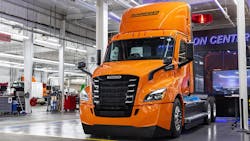Trucking firm Schneider awaiting nearly 100 all-Electric Long-Haul Class 8s from Daimler
Logistics services firm Schneider will receive nearly 100 Class 8 battery-electric vehicles (BEVs) from Daimler Truck North America (DTNA) at its intermodal operations in Southern California.
The Freightliner eCascadias for Schneider’s order will be manufactured at DTNA’s plant in Portland, Oregon. Schneider expects all 92 BEVs to be operational in its fleet by the end of 2023.
Schneider had placed an order for almost 62 eCascadias earlier and has placed an order for another 30 BEVs to add nearly 100 of these zero-emission vehicles to its fleet, creating one of the largest electric fleets in North America. It marks a critical step in the firm’s efforts towards transitioning to zero-emission vehicles and reducing CO2 per-mile emissions by 7.5% by 2025 and 60% by 2035.
Schneider reported that it has already achieved over 50% of its 2025 goal, having reduced per mile emissions by 5%. The new eCascadias have the potential to avoid over 81,000 pounds of CO2 emissions per day and these new trucks will contribute to Schneider’s sustainability goal.
“As the leading heavy-duty truck manufacturer, we are fully committed to reduce emissions with our vehicles and to move the commercial transportation industry into a more sustainable future,” said DTNA Senior Vice President Sales and Marketing David Carson. “We are proud to share the same vision with Schneider and to partner closely with them on integrating eCascadias into their fleet.” and these new trucks will contribute to Schneider’s sustainability goal.
“As the leading heavy-duty truck manufacturer, we are fully committed to reduce emissions with our vehicles and to move the commercial transportation industry into a more sustainable future,” said DTNA Senior Vice President Sales and Marketing David Carson. “We are proud to share the same vision with Schneider and to partner closely with them on integrating eCascadias into their fleet.”
The heavy-duty, long-haul Class 8 trucks are seen as the most problematic to convert to e-mobility, given fleet owners' questions over battery capacity, charging logistics and range duration, among other challenges. Last month, Tesla unveiled its own all-electric Semi model for deployment to Frito-Lay's plant in central California.
Headquartered in Green Bay, Wisconsin, Schneider has nearly 200 facilities worldwide, approximately 16,050 associates and recorded $5.6 billion in annual revenue in 2021. The trucking firm’s assets include approximately 9,000 company tractors; 36,700 company trailers; 20,600 intermodal chassis; and 25,600 intermodal containers.
About the Author
EnergyTech Staff
Rod Walton is senior editor for EnergyTech.com. He has spent 17 years covering the energy industry as a newspaper and trade journalist.
Walton formerly was energy writer and business editor at the Tulsa World. Later, he spent six years covering the electricity power sector for Pennwell and Clarion Events. He joined Endeavor and EnergyTech in November 2021.
He can be reached at [email protected].
EnergyTech is focused on the mission critical and large-scale energy users and their sustainability and resiliency goals. These include the commercial and industrial sectors, as well as the military, universities, data centers and microgrids.
Many large-scale energy users such as Fortune 500 companies, and mission-critical users such as military bases, universities, healthcare facilities, public safety and data centers, shifting their energy priorities to reach net-zero carbon goals within the coming decades. These include plans for renewable energy power purchase agreements, but also on-site resiliency projects such as microgrids, combined heat and power, rooftop solar, energy storage, digitalization and building efficiency upgrades.
